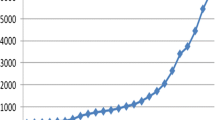Abstract
The Asia Barometer Survey of 2,000 respondents reveals that substantial majorities of the Chinese people experience feelings of happiness, enjoyment, and accomplishment. In fact, the proportion experiencing these indicators of a high quality of life are larger in China than in some more prosperous countries. Favorable historical comparison, sustained high economic growth, satisfaction with interpersonal life, and a high percentage of married people are among the explanations for China’s prevalence of subjective well-being. The Chinese people’s high levels of satisfaction with their interpersonal, material, and nonmaterial life domains, their positive assessments of their relative living standards, and their high rate of marriage are three direct positive influences on subjective well-being. Value priorities and other demographic characteristics also have indirect bearings on subjective well-being in China.




Similar content being viewed by others
References
Bell, D. A. (2006). Beyond liberal democracy: Political thinking for an East Asian context. Princeton, NJ: Princeton University Press.
Bell, D. A., Brown, D., Jayasuriya, K., & Jones, D. M. (1995). Toward illiberal democracy in Pacific Asia. New York: St. Martin’s Press.
China National Bureau of Statistics. (2003). China statistical yearbook. Beijing: China Statistical Press.
China National Bureau of Statistics. (2007). China statistical yearbook for regional economy, 2007. Beijing: China Statistical Press.
Compton, R. W. (2000). East Asian democratization: Impact of globalization, culture, and economy. Westport, CT: Praeger Publishers.
Diener, E., Gohm, C. L., Suh, E. M., & Oishi, S. (2000). Similarity of the relations between marital status and subjective well-being across cultures. Journal of Cross Cultural Psychology, 31(4), 419–436.
Easterlin, R. A. (1974). Does economic growth improve the human lot? Some empirical evidence. In P. A. David & W. R. Melvin (Eds.), Nations and households in economic growth (pp. 98–125). Palo Alto, CA: Stanford University Press.
Frey, B. S., & Stutzer, A. (2002). Happiness and economics. How the economy and institutions affect well-being. Princeton: Princeton University Press.
Fuentes, N., & Rojas, M. (2001). Economic theory and subjective well-being: Mexico. Social Indicators Research, 53, 289–314.
Haller, M., & Hadler, M. (2004). Happiness as an expression of freedom and self-determination: A comparative multilevel analysis. In W. Glatzer, S. von Below & M. Stoffregen (Eds.), Challenges for quality of life in contemporary world (pp. 207–231). Dordrecht: Kluwer.
Headey, B., Holmstrom, E., & Wearing, A. (1984). Well-being and Ill-being: Different dimensions. Social Indicators Research, 14, 115–139.
Inglehart, R., & Klingemann, H.-D. (2000). Genes, culture, democracy, and happiness. In E. Diener & E. M. Suh (Eds.), Culture and subjective wellbeing (pp. 165–16184). Cambridge: MIT Press.
Kasser, T. (2000). Two versions of the American DREAM: Which goals and values make for a higher quality of life. In E. Diener & D. R. Rahtz (Eds.), Advances in quality of life theory and research (pp. 3–12). Dordrecht: Kluwer.
Logan, J. R. (Ed.). (2002). The new Chinese city: Globalization and market reform. London: Blackwell.
Ma, J. (2004). China’s water crisis. East Bridge.
Ma, X., & Ortalano, L. (2000). Environmental regulation in China: Institution, enforcement, and compliance. Rowman and Littlefield.
Parducci, A. (1995). Happiness, pleasure, and judgment: The contextual theory and its applications. Mahwah, NJ: Lawrence Erlbaum.
Peng, D. (1996). Does confucianism matter? The role of the oriental tradition in economic development in East Asia. In A. Ikeo (Ed.), Economic development in twentieth century East Asia: The international context. Routledge.
Pye, L. W. (1992). The spirit of Chinese politics. Chicago: Harvard University Press.
Ravallion, M., & Chen, S. (2004). China’s (Uneven) Progress against Poverty. World Book Policy Research Working Paper 3408.
Ross, H. (2004). China country study in education for all: EFA global monitoring report. Paris: United Nations Educational, Scientific and Cultural Organization.
Ryan, L., & Dziurawiec, S. (2001). Materialism and its relationship to life satisfaction. Social Indicators Research, 55, 185–197.
Sirgy, M. (1998). Materialism and quality of life. Social Indicators Research, 43, 227–260.
Tu, W.-M. (Ed.). (1996). Confucian traditions in East Asian modernity: Moral education and economic culture in Japan and the four mini-dragons. Cambridge: Harvard University Press.
United Nations Development Program. (2005). Human Development Report 2005: International cooperation at a crossroads. New York: United Nations Development Program.
World Bank and China State Environmental Protection Administration. (2007). Cost of pollution in China: Economic estimates of physical damages. Washington, DC.
World Health Organization. (2008). World Health Statistics.
Author information
Authors and Affiliations
Corresponding authors
Appendices
Appendices
Rights and permissions
About this article
Cite this article
Shu, X., Zhu, Y. The Quality of Life in China. Soc Indic Res 92, 191–225 (2009). https://doi.org/10.1007/s11205-008-9350-4
Accepted:
Published:
Issue Date:
DOI: https://doi.org/10.1007/s11205-008-9350-4




